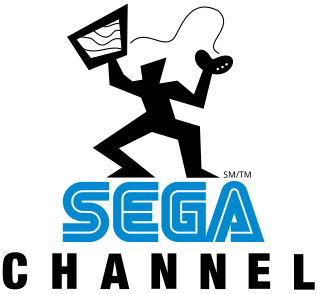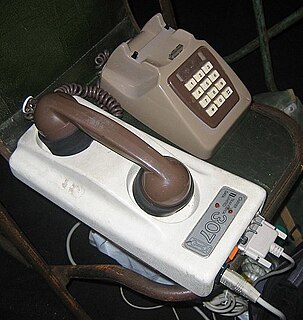It has been requested that the title of this article be changed to Digital distribution of video games . Please see the relevant discussion on the discussion page. The page should not be moved unless the discussion is closed; summarizing the consensus achieved in support of the move. |
In the video game industry, digital distribution is the process of delivering video game content as digital information, without the exchange or purchase of new physical media. This process has existed since the early 1980s, but it was only with network advancements in bandwidth capabilities in the early 2000s that digital distribution became more prominent as a method of selling games. Currently, the process is dominated by online distribution over broadband internet.
The video game industry is the economic sector involved in the development, marketing, and monetization of video games. It encompasses dozens of job disciplines and its component parts employ thousands of people worldwide.
Digital distribution is the delivery or distribution of digital media content such as audio, video, software and video games. The term is generally used to describe distribution over an online delivery medium, such as the Internet, thus bypassing physical distribution methods, such as paper, optical discs, and VHS videocassettes. The term online distribution is typically applied to freestanding products; downloadable add-ons for other products are more commonly known as downloadable content. With the advancement of network bandwidth capabilities, online distribution became prominent in the 21st century, with prominent platforms such as Amazon Video, and Netflix's streaming service starting in 2007.

Internet access is the ability of individuals and organizations to connect to the Internet using computer terminals, computers, and other devices; and to access services such as email and the World Wide Web. Internet access is sold by Internet service providers (ISPs) delivering connectivity at a wide range of data transfer rates via various networking technologies. Many organizations, including a growing number of municipal entities, also provide cost-free wireless access.
Contents
- History
- 1980s
- 1990s
- 2000s
- 2010s
- Implications
- Indie game development
- Buyer advantages and disadvantages
- Examples of video game digital distribution systems
- Current
- Obsolete
- See also
- References
To facilitate the sale of games, various video game publishers and console manufacturers have created their own platforms for digital distribution. These platforms, such as Steam, Origin, and Xbox Live Marketplace, provide centralized services to purchase and download digital content for either specific video game consoles or PCs. Some platforms may also serve as digital rights management systems, limiting the use of purchased items to one account.
Steam is a video game digital distribution platform developed by Valve Corporation. It was launched in September 2003 as a way for Valve to provide automatic updates for their games, but eventually expanded to include games from third-party publishers. Steam offers digital rights management (DRM), matchmaking servers, video streaming, and social networking services. It also provides the user with installation and automatic updating of games, and community features such as friends lists and groups, cloud saving, and in-game voice and chat functionality.
A video game console is a computer device that outputs a video signal or visual image to display a video game that one or more people can play.
Digital rights management (DRM) tools or technological protection measures (TPM) are a set of access control technologies for restricting the use of proprietary hardware and copyrighted works. DRM technologies try to control the use, modification, and distribution of copyrighted works, as well as systems within devices that enforce these policies.
Digital distribution of video games is becoming increasingly common, with major publishers and retailers paying more attention to digital sales, including Steam, PlayStation Store, Amazon.com, GAME, GameStop, and others. According to study conducted by SuperData Research, the volume of digital distribution of video games worldwide was $6.2 billion per month in February 2016, [1] and reached $7.7 billion per month in April 2017. [2]
The PlayStation Store is a digital media store available to users of Sony's PlayStation 3, PlayStation 4, PlayStation Vita and PlayStation Portable game consoles via the PlayStation Network. The store offers a range of downloadable content both for purchase and available free of charge. Available content includes full games, add-on content, playable demos, themes and game/movie trailers.

Game Digital plc is the parent company of Game Retail Limited, a British video game company that trades under the Game brand, stylised as GAME.
GameStop Corp. is an American video game, consumer electronics and gaming merchandise retailer. The company is headquartered in Grapevine, Texas, United States, a suburb of Dallas, and operates 5,830 retail stores throughout the United States, Canada, Australia, New Zealand, and Europe. The company's retail stores primarily operate under the GameStop, EB Games, ThinkGeek and Micromania brands.










